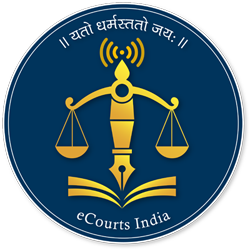e-Initiatives of Madras High Court
JUDICIAL OFFICERS MANAGEMENT SYSTEM
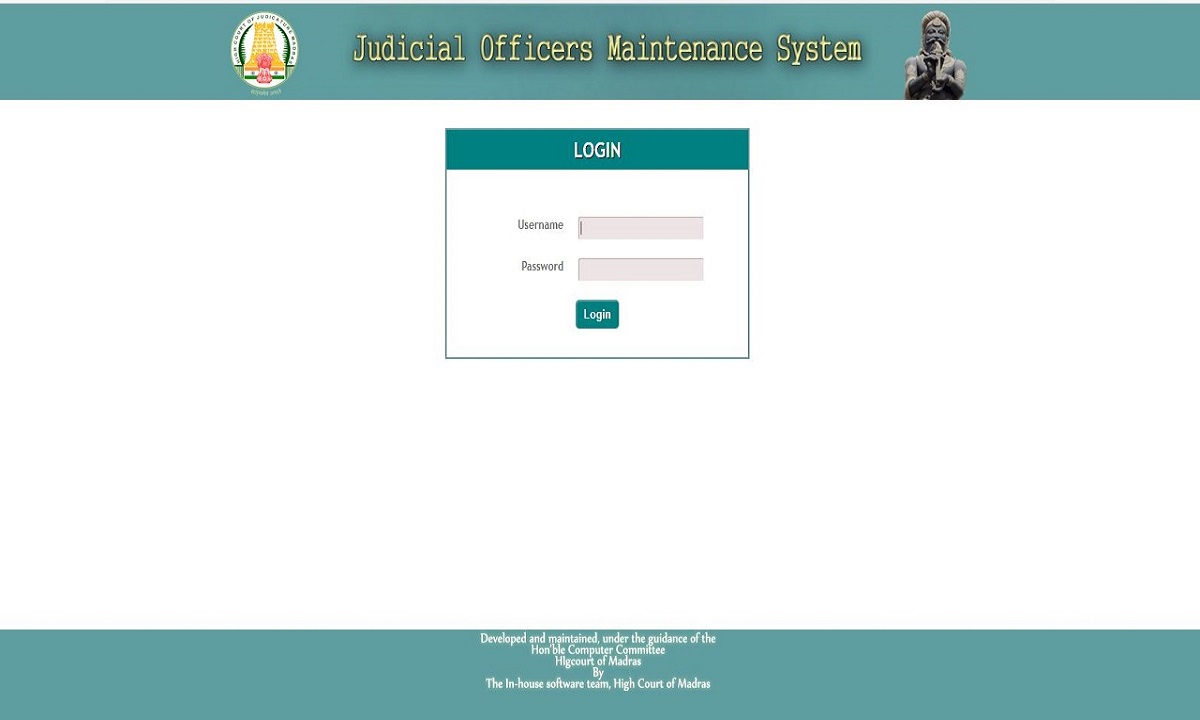
A Module pertaining to the Personal information of the Judicial Officers in the State of Tamil Nadu and U.T. of Puducherry. It includes –
• Judicial Officers Transfer History.
• Annual Transfer request of Judicial Officers
• Complaints against Judicial Officers.
RECRUITMENT SOFTWARE MODULE
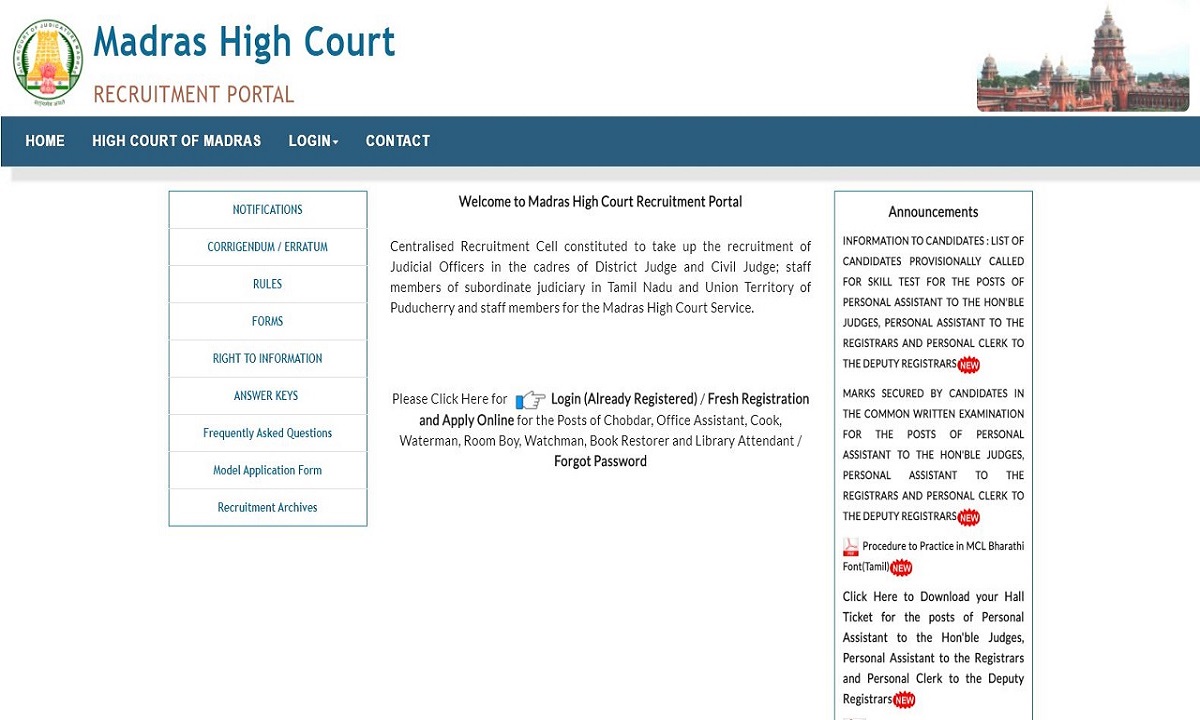
The Recruitment Software Module has been developed by the In-house Software team to fill up the vacancies in the Madras High Court Service and Other vacancies in District Judiciary (Judicial Officers / Staffs), through on-line mode. So far 09 nos. of recruitment has been successfully made using this platform.
DISPLAY BOARD SERVICE

Display Boards have been installed with latest configuration in all the Courts Halls and various places of High Court, Madras and Madurai Bench of Madras High Court, thereby enabling the Advocates and litigant public to know the stage of the court proceedings. Display Board status is also available at the High Court website and made accessible through internet, which ultimately facilitates the Advocates, Litigant public and other stake holders in availing the service.
BIOMETRIC ATTENDANCE IN SUBORDINATE JUDICIARY
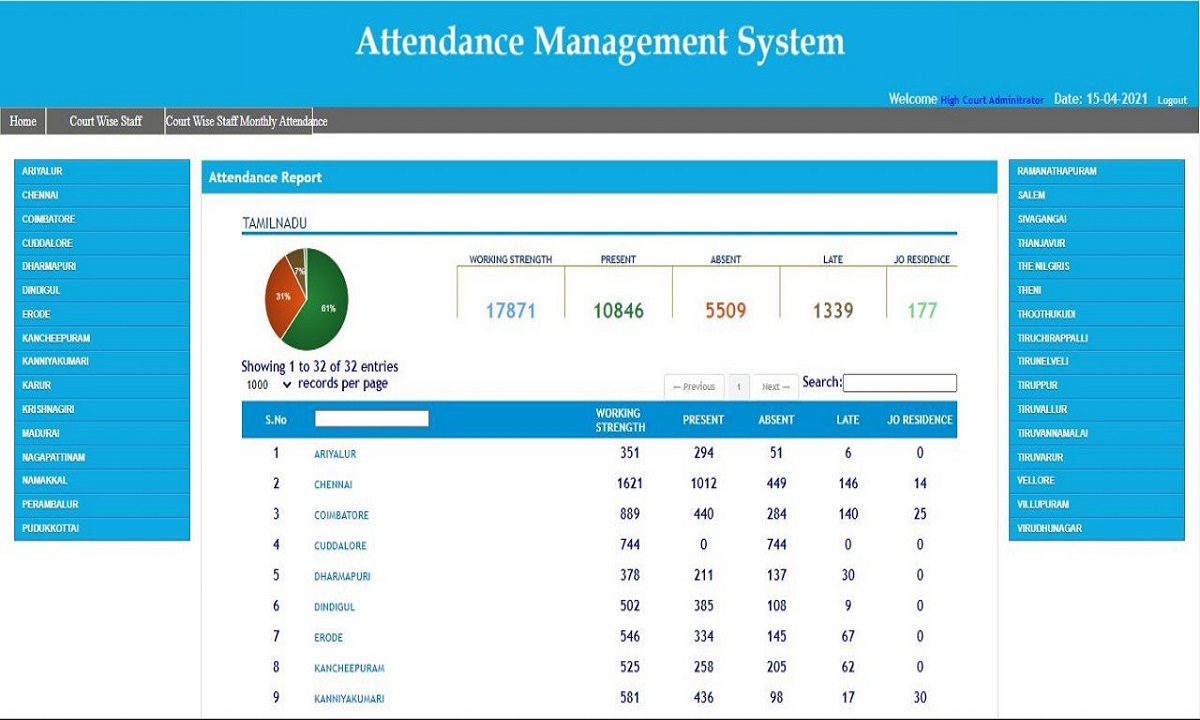
The High Court of Madras has implemented Biometric Attendance System in the Principal seat, Chennai and also in Madurai Bench successfully. In order to facilitate the monitoring of attendance of all the staff members in the District Judiciary in the State of Tamil Nadu, as per the direction of the Hon’ble Computer Committee, Madras High Court, 547 numbers of Biometric Machines have been procured for all Court Complexes situated in the District Judiciary. The Biometric Attendance System in the District Judiciary has been inaugurated by the Hon’ble Dr. D.Y.Chandrachud, Chairman, Hon’ble Judge and Chairman, Hon’ble eCommittee, Supreme Court of India in the presence of then the Hon’ble The Chief Justice, Madras High Court and same came into effect from 01.10.2020.
E-FILING

As per the direction of the Hon’ble e-Committee Supreme Court of India, the e-filing facility has been implemented in the Madras High Court from the month of April 2020 and the Subordinate Courts from the month of May 2020 initially for bail matters. The said e-filing facility is extended to all types of Cases in the Madras High Court from the Month of August 2021 and the Subordinate Courts from the Month of September 2021. As on 09.02.2022, 637 Cases were filed in the Madras High Court and 23,399 Cases were filed in the District Courts.
The Madras High Court has framed the draft rules on “Madras High Court e-filing Rules 2020” in accordance with the Model rules received from the Hon’ble e-Committee, Supreme Court of India on e-Filing and the same has been published in the Tamil Nadu Government Gazette on 18.11.2020. The said Rules have also been hosted in the Madras High Court Website (www.hcmadras.tn.nic.in).
NATIONAL SERVICE TRACKING OF ELECTRONIC PROCESSES (NSTEP)

Madras High Court has implemented the National Service Tracking of Electronic Processes (NSTEP) across the courts in the State of Tamil Nadu and U.T of Puducherry on 17.09.2020. N-STEP has been inaugurated by the Hon’ble Dr. D.Y.Chandrachud, Chairman, Hon’ble Judge and Chairman, Hon’ble eCommittee, Supreme Court of India in the presence of then the Hon’ble The Chief Justice, Madras High Court and same came into effect from 01.10.2020.
2906 Nos. of Android Smart Phones through GeM portal and 2906 SIM cards from BSNL has been processed for the usage of the Process Servers (Senior and Junior Bailiff) across the courts in the State of Tamil Nadu and U.T of Puducherry.
As on 09.02.2022, 2,32,359 Nos. of processes has been consumed and 1,05,858 Nos. of processes has been delivered by the Process Servers (Senior and Junior Bailiff).
VIRTUAL COURT
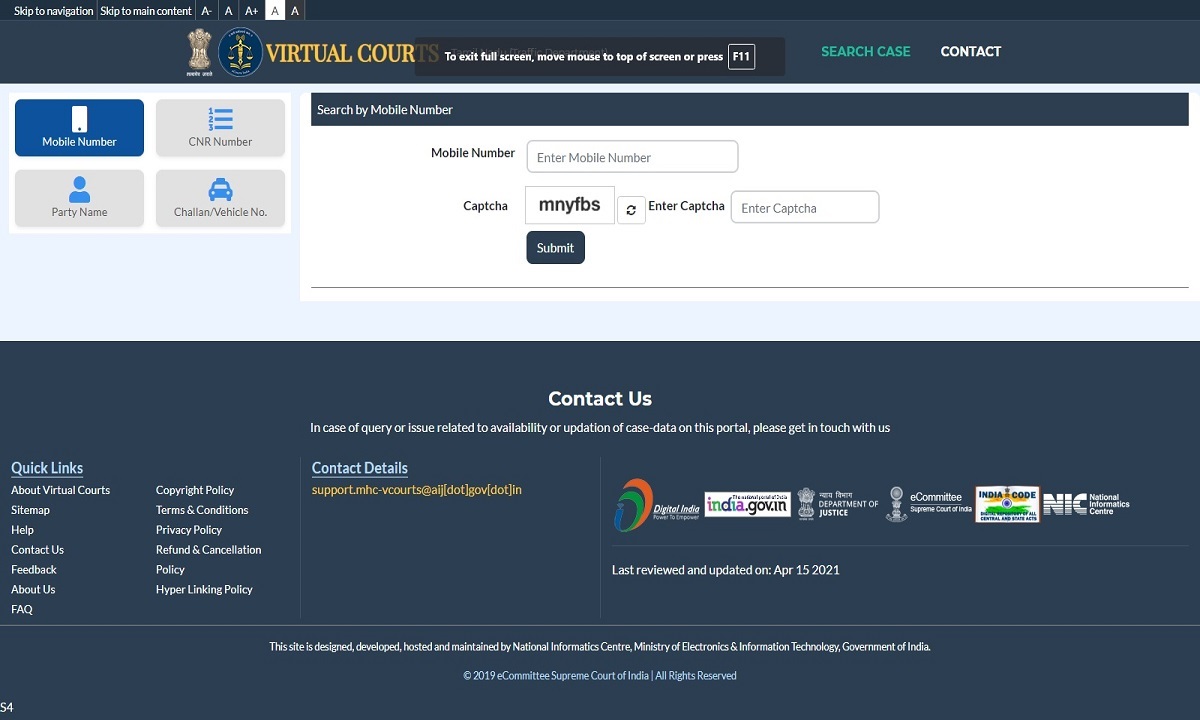
As per the direction of the Hon’ble e-Committee, Supreme Court of India, NIC has designed and developed the Virtual Court Software module which is aimed at eliminating presence of litigant or lawyer in the court and adjudication of the case online.
The Madras High Court has implemented the Virtual Court facility (online disposal of the cases by paying fine online using SBI ePay) in the XXI and XXII Metropolitan Magistrate Courts at Chennai District (Mobile Courts) on 26.05.2020. Wherein, the violators of the Motor petty cases are provided with the facility to pay the fine amount online through SBI payment gateway. As on 09.02.2022, 28,132 traffic challan cases were disposed and fine amount of Rs.21,51,75,120/- (Rupees Twenty One Crore Fifty One Lakh Seventy Five Thousand One Hundred and Twenty Only) have been collected online through SBI e-Payment gateway. Steps are being taken to extend the facility to the other Districts in co-ordination with NIC.
NORMS SOFTWARE FOR ASSESMENT OF JUDICIAL OFFICERS
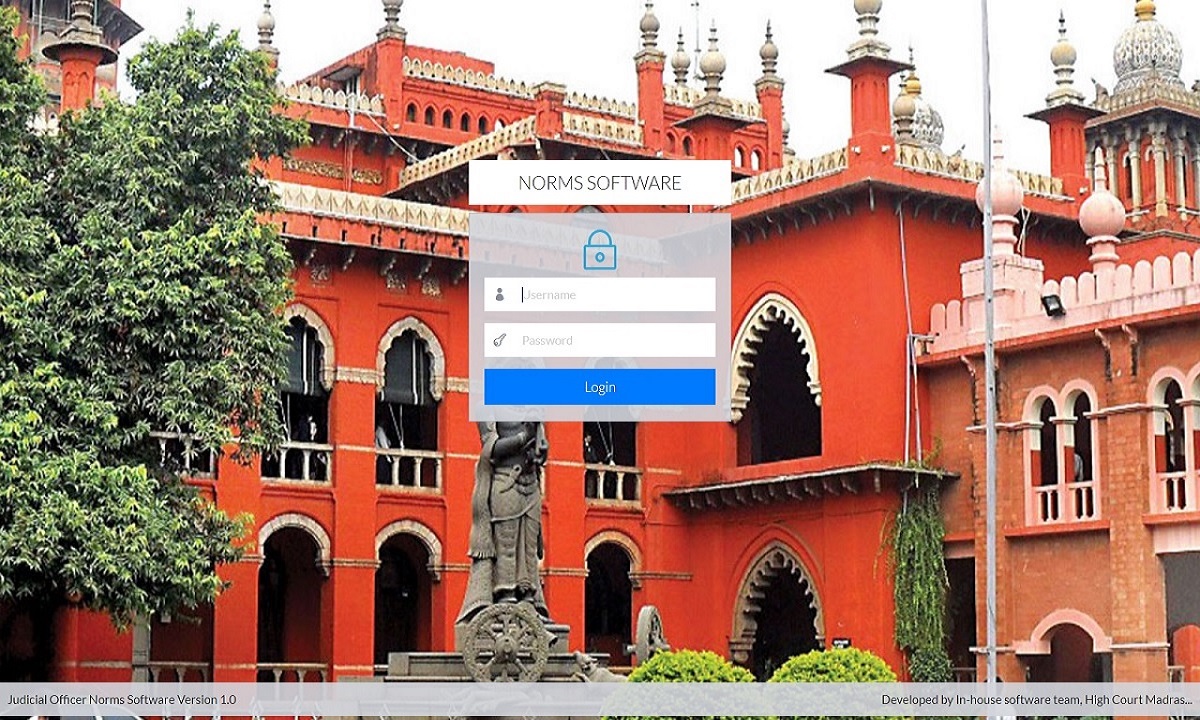
The In-house Software Team of the Madras High Court has developed Norms Software for auto calculation of work done by the Judicial Officers in the District Judiciary from the CIS Software database.
The module comprises of three Logins, namely, Norms Court Login, Unit Head Login and High Court Section Login.
The Module captures the details of viz., Judge/Court, Judge Period, Norms fixed for that particular Court, Number of days spent on Boycott, Nature and Year wise disposal of cases along with the Institution and Actual pendency of the Court. A Report is generated with the above particulars which facilitates the Unit Head to endorse his or her remarks. The High Court Section could view the Report along with Unit Head Remarks and the same could be placed before the Hon’ble Judges for appraising the Officer’s performance. A perfectly designed User Manual was also issued for easy guidance.
E-NOTICE BOARD WITH WAY FINDER FACILITY
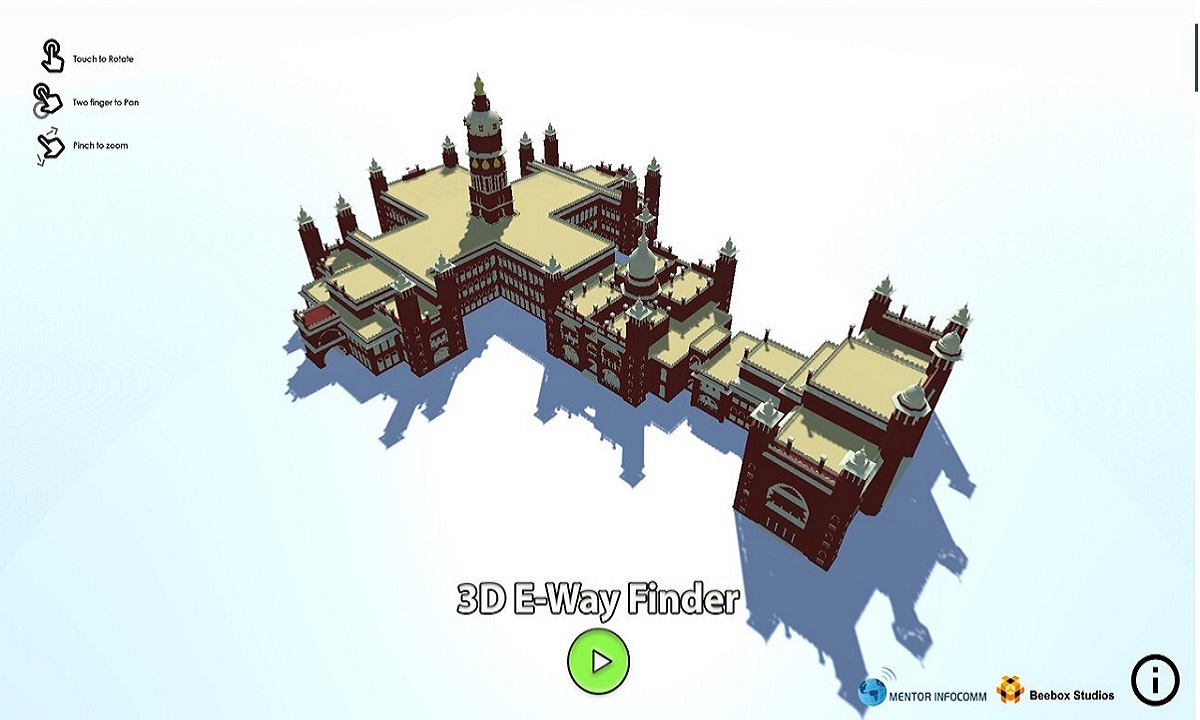
“Way finding” refers to the tools and processes used to help people, find their way from a starting place to a destination, and possibly also help them to get more information about the facility. Citizen Centric Services are being provided to the litigant public and the “Digital Way Finder” is one among the facility for the use of Advocates and Litigant Public, easily to navigate the Court Halls, Sections (both Judicial and Administrative), Information Center, R.O. water, Rest rooms, Lift, etc., This facility is quickly conveying the information with the touch of a finger.
STUDIO BASED VIDEO CONFERENCING FACILITY
The State Government have accorded sanction for a sum Rs.22.84 Crore for procurement of Studio based Video Conferencing Equipment, Digital Video Recording Unit, Document Visualizer and other accessories in 233 Court Complexes.
Studio based Video Conferencing facility has been implemented in 199 Court Complexes in the State of Tamil Nadu and at the Principal Seat of Madras High Court and Madurai Bench.
DESKTOP BASED VIDEO CONFERNCING FACILITY
Desktop based Video Conferencing facility has been implemented in 259 Court Complexes and 111 Jails for the purpose of remands and production of under-trial prisoners through Video conferencing in the State of Tamil Nadu and the U.T. Puducherry.
VIDEO CONFERENCING – COURT HEARINGS
MICROSOFT TEAMS LICENSE
Due to COVID-19 pandemic lockdown, the Registry has procured 100 Microsoft Teams Video Conferencing License to conduct Court Proceedings through Video Conferencing for the use of Hon’ble Judges of High Court, Madras, Madurai Bench and for the Administrative purpose of High Court, Madras.
The Registry has also procured 1068 Microsoft Teams Video Conferencing License for the use of Judicial Officers in the State of Tamil Nadu and 3 CISCO Webex for the use of Commercial Division.
VIDEO CONFERENCING – COURT HEARINGS
MADRAS HIGH COURT VIDEO CONFERENCING IN COURTS RULES, 2020
Based on the draft rules of the Hon’ble Supreme Court of India on Video Conferencing, the Madras High Court has formulated the “The Madras High Court Video-Conferencing in Courts Rules, 2020” and the same has been published in the Tamil Nadu Government Gazette on 15.07.2020. The said Rules have also been hosted in the Madras High Court Website (www.hcmadras.tn.nic.in).
VIDEO CONFERENCING – COURT HEARINGS
MADRAS HIGH COURT VIDEO CONFERENCING STATISTICS
As per the Video Conferencing Statistics published in the Newsletter of the Hon’ble eCommittee, Supreme Court of India, for the month of November 2021, the High Court of Madras stands in the first position for hearing 12,09,638 (Twelve Lakh Nine Thousand Six Hundred and Thrity Eight) number of cases through Video Conferencing in the Madras High Court during the COVID-19 Lock-down.
LEASED LINE CONNECTIVITY
As per the direction of the Hon’ble Computer Committee, Leased Line Connectivity at the Principal Seat of Madras High Court and the Madurai Bench of Madras High Court has been upgraded from 100 MBPS to 1GBPS and 50MBPS to 250 MBPS respectively.
TAMIL NADU STATE WIDE AREA NETWORK (TNSWAN) CONNECTIVITY
8 MBPS TNSWAN Connectivity has been implemented in 269 Court Complexes in the State of Tamil Nadu, 100 MBPS for Madras High Court and 32 MBPS for Madurai Bench of Madras High Court for a seamless, stable, reliable and secure connectivity
DIGITAL SIGNAGE BOARD
In order to have effective access to Justice, the litigant(s) should be made aware of the services and facilities available in the Courts. High Court of Madras thought it fit to create legal awareness among every Litigant / Citizen about the services available and thereby paving way for effective dispensation of Justice. This facility is used for dissemination of:
• Legal Aid Camps
• Lok Adalat
• Jail Adalat
• To show case the important achievement of the Judiciary
• Mediation Programme
• e-Court Awareness
• Live Telecast of important functions through intranet and internet.
JUSTICE CLOCK
Justice Clock is an outdoor electronic information display system, technically a LED based video wall, which is used for information dissemination and creating awareness about the disposal of cases in various courts in order to highlight the work being done. The information is derived from data which are already available on the National Judicial Data Grid (NJDG). Justice Clocks are being used to provide information on various services provided by the court complexes to the General Public, thereby reducing the information gap between the judiciary and the litigant.
The Hon’ble The Chief Justice has inaugurated the Justice Clock for the Principal Seat at Madras on 16.12.2019.
The Hon’ble Mr. Justice. T.S. Sivagnanam, Chairman, Hon’ble Computer Committee, has inaugurated the Justice Clock at Madurai Bench on 01.11.2019.
E-SEWA KENDRA

As per the direction of the Hon’ble e-Committee, Supreme Court of India, eSewa Kendra has been established at the Principal Seat at Madras High Court and in Madurai bench of Madras High Court on 15.05.2020. eSewa Kendra was also established at Yercuad Taluk in Salem District on 17.09.2020 and also in the District Head Quarters of Krishnagiri District on 03.07.2021 by the Hon’ble the Chief Justice of High Court Madras with the existing infrastructure.
COURT CASES MONITORING SYSTEM (CCMS) – INTEGRATION OF CIS WITH CCMS PORTAL
The Madras High Court has implemented the integration of Madras High Court’s Case information System (HC-CIS) with Court Cases Monitoring System (CCMS) for the purpose of sharing of court data and documents pertaining to State Government. Upon the request of the State Government and to meet the growing need of the digitized data, as per the direction of the Hon’ble Computer Committee, Madras High Court in coordination with NIC has deployed the integration of Madras High Court’s Case information System (HC-CIS) with Court Cases Monitoring System (CCMS) of the State.
* This system helps the government to monitor the cases in which government itself is a party and to respond better on the pending cases.
* The concerned Stakeholders (State Government) will be informed of about the cases on the hearing dates.
* It helps the concerned officials to file the necessary counters and rejoinder in appropriate time.
BRAILLE PRINTER FOR THE VISUALLY CHALLENGED
To provide access to the visually challenged Advocates and litigant public and as a part of complying the provision of “The Rights of Persons with Disabilities Act, 2016”, the Registry has installed “Braille Printer” for the use of visually challenged persons at the Principal seat and Madurai Bench of Madras High Court initially.
High Court is a prominent place where more than thousands of litigant public and Advocates are making their presence and to enhance the citizen centric services being provided to the litigant public especially to the visually challenged persons, the Registry has installed Braille Printer in the premises of Madras High Court. The Printer has the capability of printing 350 Braille pages per hour and it is simple and easy to use. An official notification is published in the official website of Madras High Court (http://www.hcmadras.tn.nic.in/) regarding availability / facility of Braille Printers for Judgments / Orders at the Principal Seat with effect from 15.11.2021.
QR CODE IN ORDERS AND JUDGMENTS HOSTED IN MADRAS HIGH COURT WEBSITE
As envisioned by the Hon’ble Chairman, E-Committee, Supreme Court of India, the QR Code is embarked in the Orders and Judgments of the Principal Seat of Madras High Court and Madurai Bench of Madras High Court to authenticate the order/ judgments that are printed from the official website of the Madras High Court. Though Madras High Court was one among the fore runner in implementing the watermarking feature without compromising the legibility and readability of the Orders and Judgments, QR Code feature is now being enabled to ensure authenticity and accessibility. The QR Code enables the user to view the web copy of the Orders and Judgments hosted in the website instantly through the Smartphone by scanning it. The QR code generated for the each and every order is unique and therefore it avoids duplication.
DOCUMENT PAGINATION MODULE
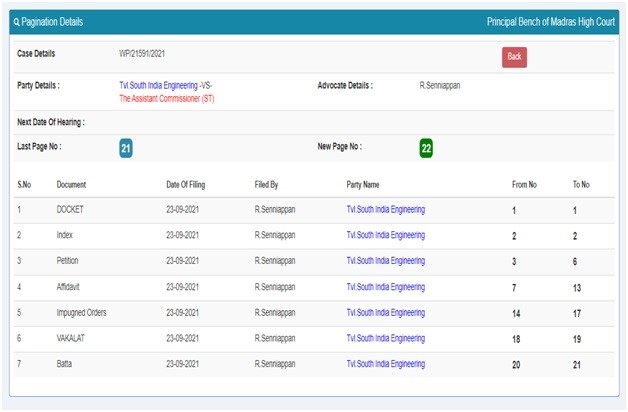
The Document Pagination module is an online facility to ensure chronological paging of the paper book of each petition/ appeal filed in the Principal Seat of High Court. It provides information as to Last Pagination Number and Next Pagination Number of a case through web-interface. The Module is available at (https://www.madrashighcourt.tn.gov.in/pagination) and an official notification is published in the official website of Madras High Court regarding rolling out of the said module with effect from 15.11.2021. The Advocates / Party-in-Person could verify the last page number/next page number in the High Court’s Kiosk/official website of Madras High Court and paginate the additional papers/document that is to be filed in an already existing case.
It ensures that the Hon’ble Judges and Advocate / Party-in-Person to work with the same pagination. Instead of referring to the name of the document, the Advocate / Party-in-Person shall refer the page number allotted by the Pagination Software at the time of representation / argument before the Court of law.
DIGITIZATION MODULE FOR ADMINISTRATIVE RECORDS
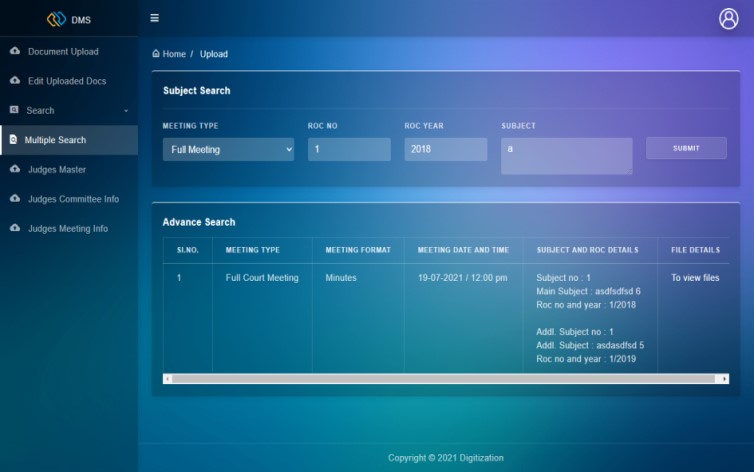
As per the direction of the Hon’ble the then Chief Justice, High Court of Madras, the In-House Software Team has developed the Software Module for viewing and searching the Minutes of the Hon’ble Full Court and Hon’ble Administrative Committee in the digitized format from the year 1990. The User Credentials were created for the Staff Members (for uploading the files) and necessary training on the usage of the said Module was also imparted.
In addition to the above said software module, a separate online module for the Hon’ble Judges to view the Minutes of the Hon’ble Full Court and also the Hon’ble Administrative Committee (could be accessed only by the Hon’ble Administrative Committee Judges) from January 2021 to till date was developed. To ensure security and ease of use, a separate login credentials is provided for the Hon’ble Judges with a dashboard. In the said module the Minutes of the Hon’ble Full Court and the Hon’ble Administrative Committee could be viewed / searched by selecting the meeting date or subject matter. For effective usage of the module, training to the concerned Staff members (for uploading the files) and P.A’s of the Hon’ble Judges has also been imparted.
ADVOCATE INFORMATION AND MANAGEMENT SYSTEM (AIMS)

The Advocate Information and Management System, a project / facility for dissemination of Citizen Centric Service is implemented at the Principal Seat of Madras High Court with effect from 15.11.2021, to facilitate Advocates in mapping their mobile numbers with the legacy cases (mobile number not updated cases) based on their respective enrolment number and appearance of cases. Advocate could login to the system using his enrolment number and could add cases to his List for which he/she is appearing for.The Court officials would verify and approve the appearance of the Advocate for a particular case mapped. The Advocate would receive case information as to listing and adjudication of all the mapped case through SMS. The Advocate is also provided with a VC Link to participate in the court proceeding, if the mapped case is listed today (current date). The Module is available at (https://www.madrashighcourt.tn.gov.in/aims) and an official notification is published in the official website of Madras High Court.
E-PAYMENT
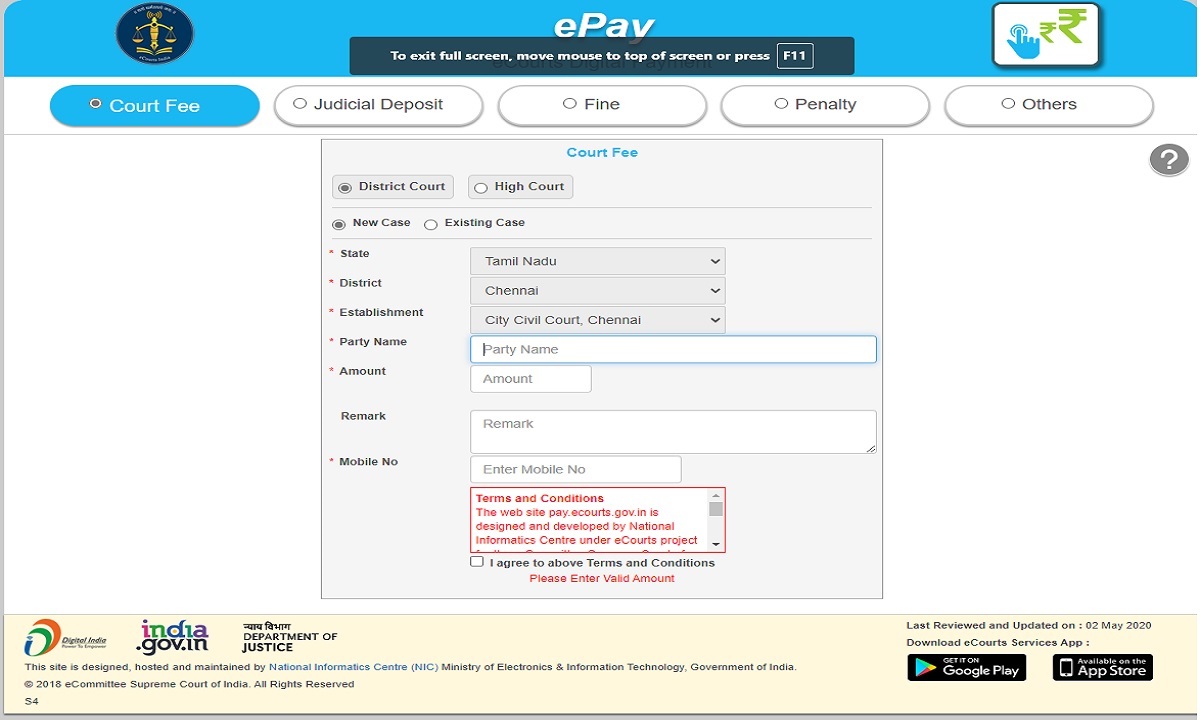
As per the direction of the Hon’ble e-Committee, Supreme Court of India, the High Court of Madras has entered into a MoU with the State Bank of India for enabling e-payment of Court fee, Fine, Penalty and Judicial deposits by integrating the Case Information System with SBI ePay payment gateway.
The Madras High Court has addressed the State Government for amendment of Sections 74 and 75 in Tamil Nadu Court Fees and Suit valuation Act, 1955 to accept the court fees electronically through e-payment.
The State Government has amended the Tamil Nadu Court Fees and Suit Valuation Act, 1955, by promulgating an ordinance “Tamil Nadu Ordinance 2020” to enable e-payment of Court Fee.
The Registry is in the process of implementing epayment facility wherein Advocates/Litigants/Party-in-person would be provided with the option of paying Court fee, Fine, Penalty and Judicial deposits through online mode using SBI epay Payment Gateway interface. Payment of Court Fees through eStamps has been implemented and made functional in the Principal Seat at Madras High Court and the Madurai Bench from 2018, through the Central Record Keeping Agency, M/s.Stock Holding Corporation of India Limited. As per the direction of the Hon’ble Computer Committee, Court fees procurement through eStamp has been extended to the District Judiciary.
ONLINE PORTAL FOR GENDER SENSITIZATION AND INTERNAL COMPLAINTS (GSICC)
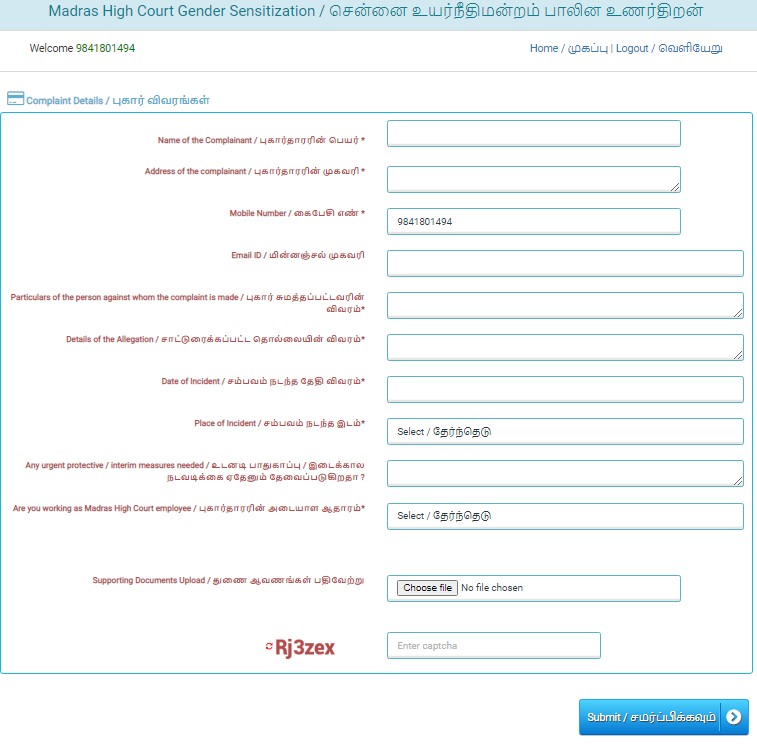
As per the direction of the Hon’ble Computer Committee and the Hon’ble Gender Sensitization Committee, the In-House Software Team of Madras High Court has developed an Online Portal for Gender Sensitization and Internal Complaints Committee for registering the complaints regarding gender related issues through online (https://www.mhc.tn.gov.in/gsicc). The portal is bilingual (supports English and Tamil) and is user friendly. The GSICC portal of the High Court Website would enable the complaints/ Victim of gender bias, be it the staff of the Registry or any other person within the precincts of the Madras High Court to lodge in her/his grievance. The said on-line complaint portal was officially launched by the Hon’ble The Chief Justice of Madras High Court in the presence of members of the Hon’ble Gender Sensitisation and Internal Complaints Committee-I(GSICC-I), Principal Seat, Madras High Court and other companion judges on 29.10.2021.
The features of the portal are:
* The Complainant / Victim could login to the GSICC portal (Official portal of Madras High Court) using their Mobile Number through OTP Verification.
* Soon after the login, the Complainant / Victim could lodge their complaint by entering the details which are requested in the entry form (Bilingual)
* Upon submission of the entry form, the registration number (Unique Number for the Complaint) will be generated for the logged complaint and the user can track the status of the complaint with the generated number.
* Once, the complaint is lodged, the complaint particulars will be made available in the Gender Sensitization Committee dashboard for redressal process.
* The authorities concerned can update the action taken details under the Action Taken menu viz., Pending verification, pending for Preliminary assessment, pending for
Enquiry, Pending for Report etc., and the details of same will be reflected in the Committee Members dashboard as well as in the victim’s dashboard.
* The portal has facility to generate various types of reports based on the requirements of the Registry.

